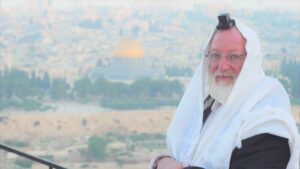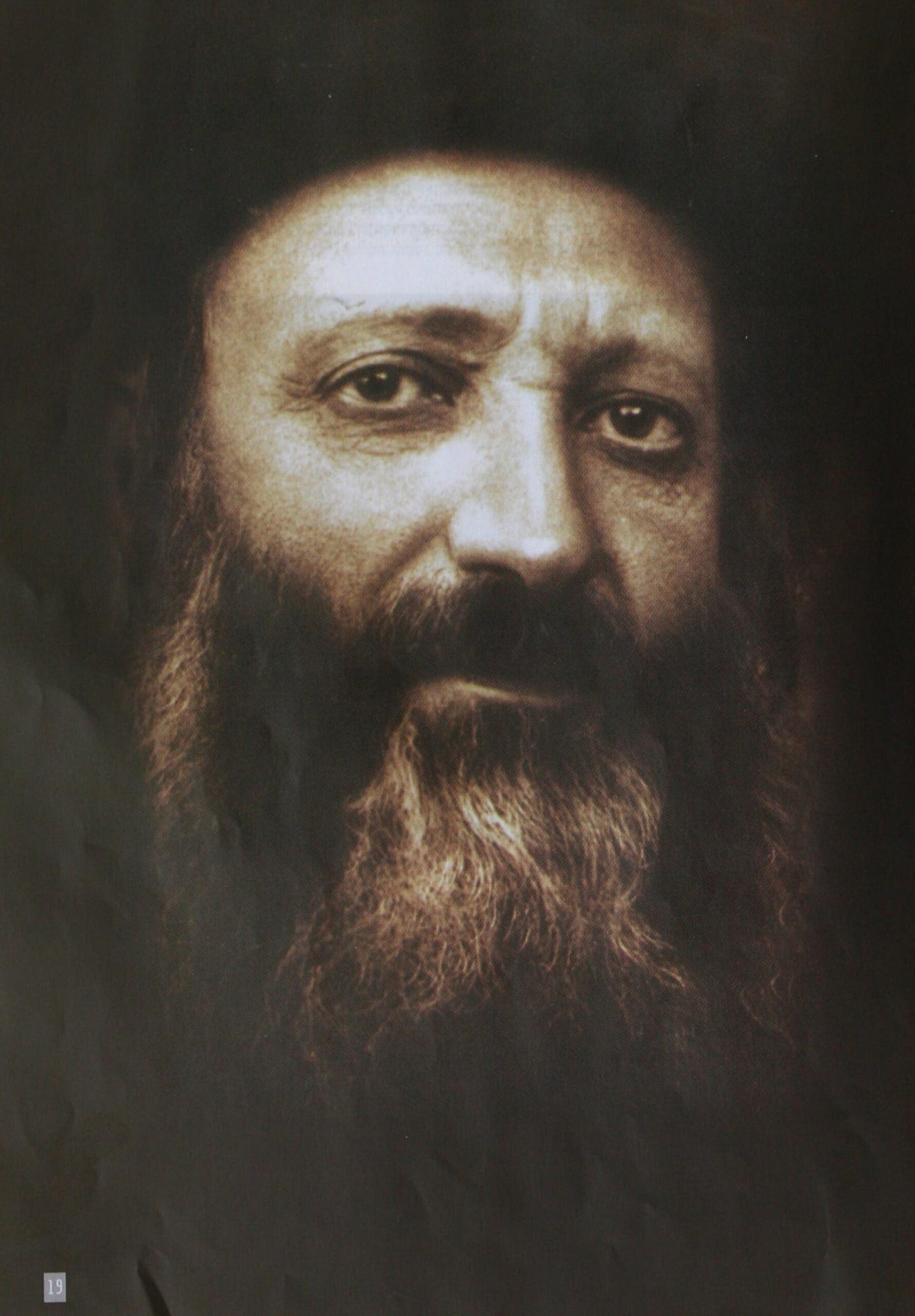Rabbi Kook on Love
Interview with Rabbi David Samson

On the background of the angry demonstrations in Israel against Prime Minister Benjamin Netanyahu and the proposed judicial reform, and since we are now in the Nine Days leading to Tisha B’Av, it is an appropriate time to review Rabbi Kook’s writing on Ahavah. Many people have warned that the current atmosphere of brother against brother, and the lack of unity it causes, could lead to the same “sinat chinam” (senseless hatred) which led to the destruction of the Second Temple, may Hashem have mercy.
Rav Avraham Yitzhak HaKohen Kook, Israel’s first Chief Rabbi, was famous for his love for all people, including the zealots who berated him in the Ultra-Orthodox community. His love, as is well known, extended to the secular, pioneer builders of the Land who largely abandoned the beloved yoke of Torah. I spoke to Rabbi David Samson, author of four commentaries on Rabbi Kook’s writings to learn more about Rav Kook’s exalted teachings:
“Every year,” he related, “During my 12 years of study in the Mercaz HaRav Yeshiva in Jerusalem, Rabbi Kook’s son, HaRav Tzvi Yehuda Kook, would go over his father’s teachings on ‘Ahavah,’ often reading word-for-word from Rabbi Kook’s writings, without changing a sentence or adding commentary of his own. He said that the Three Weeks was an ideal time to go over his father’s deep insights on the subject of Ahavah, a discipline of Torah vital to the prosperity of the Israelite Nation who stood together with one heart at Mount Sinai.
“Loving thy neighbor as thyself,” Rav Kook stated, “and the work of stressing the good in the Clal, and in the individual, isn’t simply work on the emotional level alone, but a great occupation of Torah, and a profound reach of wisdom. (Orot, Orot Yisrael, 4:1). Every year, Rabbi Tzvi Yehuda would tell new students that his father stressed that Ahavat Yisrael was not an abstract feeling but commandment of the Torah that had to be worked on and observed as meticulously as every clause in the Shulchan Oruch. Rabbi Kook wrote:
“It is a great and enlightening task to totally remove anger from the heart and to feel unlimited compassion and kindness, to gaze upon everything with a favorable eye, even upon the actions of the most wicked, in emulation of the pure Divine Eye, to feel compassion for those sunk in the mire of evil, and to find some good in them,” (Orot HaKodesh, Vol. 3, Pg. 326).
“Rabbi Kook taught that even the sinners of Israel, as long as they identified themselves with the Israelite Nation, albeit in distorted fashions, were worthy of unreserved love. He wrote:
“The pious of the generation, lofty holy men, must disregard any deficiency or flaw in every Jewish soul that is in any way attached to the Rock from which it was hewn. Instead, they must raise the point of connection to Clal Yisrael that exists in every individual soul to its heights and exalted holiness. Nothing can diminish the unlimited love for the Nation, the source of our life, as it says: ‘He has not seen beheld iniquity in Yaacov, nor has He seen perverseness in Israel’” (Orot, Orot HaTechiyah, 24).
“Rabbi Kook’s followers often beseeched him to strike back at those who sought to besmirch him and belittle his greatness in Torah.
“With all of their wickedness,” he wrote, “As long as they cling to the collective of the Nation (Clal Yisrael), they are included in the verse, ‘Your people are all righteous’” (Yisheyahu, 60:21; Orot HaTechiya, 20).
Rav Kook explained that this outer wickedness served to fortify the strength of the righteous, who must struggle against this darkness by adding more light. I think this applies as well to the so-called anarchists and radical leftists of our time. While we don’t have to agree with their beliefs, just look at their misirut nefesh (spirit of self-sacrifice) for what they believe is the salvation of the nation. People return week after week to the streets of the country to stand in the hot sun in order to demonstrate for their idea of Israeli democracy and freedom. This forces us to explain on a higher level that what they seek is really to be found in the Torah. They demand life without restrictions filled with expansive universal horizons. We too often respond with cries of ‘Shabbos, Shabbos.’ As Rav Kook emphasizes, our job is to embrace them with love and immerse them into a world of true equality and justice, when mankind will no longer be slaves to their evil inclinations and misguided passions. This is the Torah of Redemption that we so yearn for, along with the rebuilding of the Beit HaMikdash, may it be soon.”
Often, non-religious Jews hold up Rav Kook as a paragon of tolerance and an advocate of embracing all opinions in the name of harmony and peace.
“Rabbi Kook saw the shortcomings of his generation as much as anyone in his time. Nevertheless, he sought to find merit in every Jew – the sign of an enlightened leader. In explaining this, Rabbi Tzvi Yehuda would point to the chapter on Sainliness in the book, ‘Mesillat Yesharim,’ where the famed Kabbalist, Rabbi Moshe Chaim Luzzato, writes: ‘These are the true shepherds of Israel, whom the Holy One Blessed Be He greatly desires, those who sacrifice themselves for His sheep, who petition and actively work for their peace and benefit in all of their endeavors, and who forever stand in the breach to pray for them, in order to nullify stern decrees, and to open the gates of blessing for them.’”
“The great love that we feel for our Nation does not shut our eyes to its blemishes,” Rav Kook wrote. “Even though loving mankind encompasses everyone, and sometimes an evil person also falls into this general love, this doesn’t in any way interfere with hating evil,” (Orot, Orot Yisrael, 4:3).
“Rav Kook taught that hatred should only be directed toward the evil and filth in the world. He wrote: ‘It is proper to hate a corrupt person only for his defects, but insofar as he is endowed with a Divine Image, it is necessary to love him. We must realize that this precious dimension of his worth is a more authentic expression of his nature than the lower characteristics that developed in him through the circumstances of his life,’” (Midot HaRayah, Ahavah, 9).
“While Rabbi Kook’s love for the Jewish People knew no bounds, one should not think that he was some sort of liberal, reform rabbi who believed that everyone was free to do his own thing, G-d forbid. On the contrary, he harshly condemned desecrations of the Torah and did all he could to inspire transgressors to mend their ways. For instance, he writes, ‘Whoever undermines, through the proliferation of ideas, and, all the more so, through deed, the holy idea which vitalizes the Israelite Nation, he is a traitor to the Nation, and to pardon him is folly,’ (Letters, 93).
What can we learn from Rav Kook today when it comes to Ahavat Yisrael?
“The purely righteous,” Rav Kook wrote, “Do not complain about wickedness – they increase righteousness. They do not complain about heresy – they increase faith. They do not complain about ignorance – they increase wisdom.”
“Rav Kook warned that the lack of brotherly love in the Jewish Nation causes disunity which weakens the spirit of Nation, and jeopardizes our continued settlement of the Land. The rifts we see today, whether between political parties, between the religious and the secular, or within the religious world itself, are obstacles which prevent us from working together in unison to pull the wagon of Israeli nationhood out of the darkness of division toward the light of Redemption. This can only be rectified, Rabbi Kook taught, by an active and encompassing love. He stated: ‘Since groundless hatred caused the destruction of the Second Temple, in order to bring about the Temple’s rebuilding, we have to increase unlimited love.’ This love is not dependent on anything. It is like G-d’s unconditional love for Israel. This love exists regardless of any shortcomings in the beloved, or without any conditions that have to be met. Even with all of the deficiencies and imperfections in people, love must be total. There can be great differences in personalities, or disagreements in learning, or debates over the right thing to do, but true Ahavah transcends all of this and surrounds all of the Jewish People, like the eternal love of G-d for His chosen Children.’ What was true in Rabbi Kook’s time is true for us today. We have to love our fellow Jews and bring them closer to the Torah. The joyous love we feel on Tu B’Av for all Jews helps bring us to this exalted level, to which we are called upon to cling throughout all of the year.”






